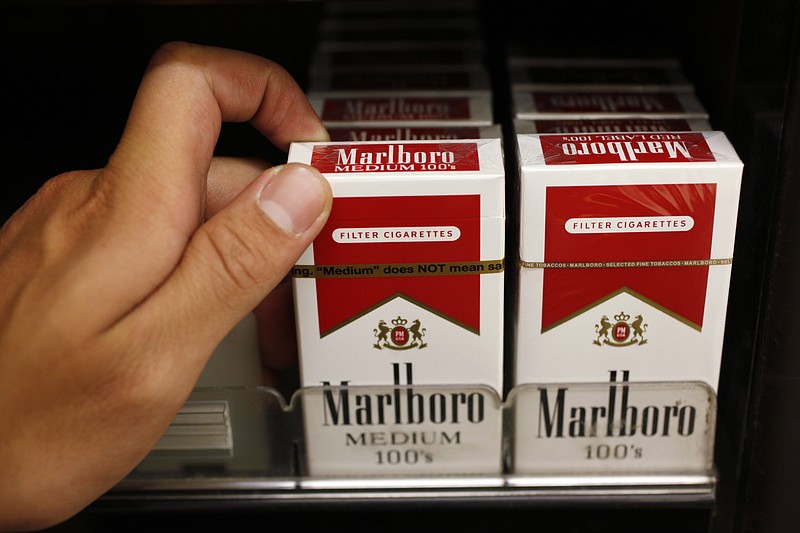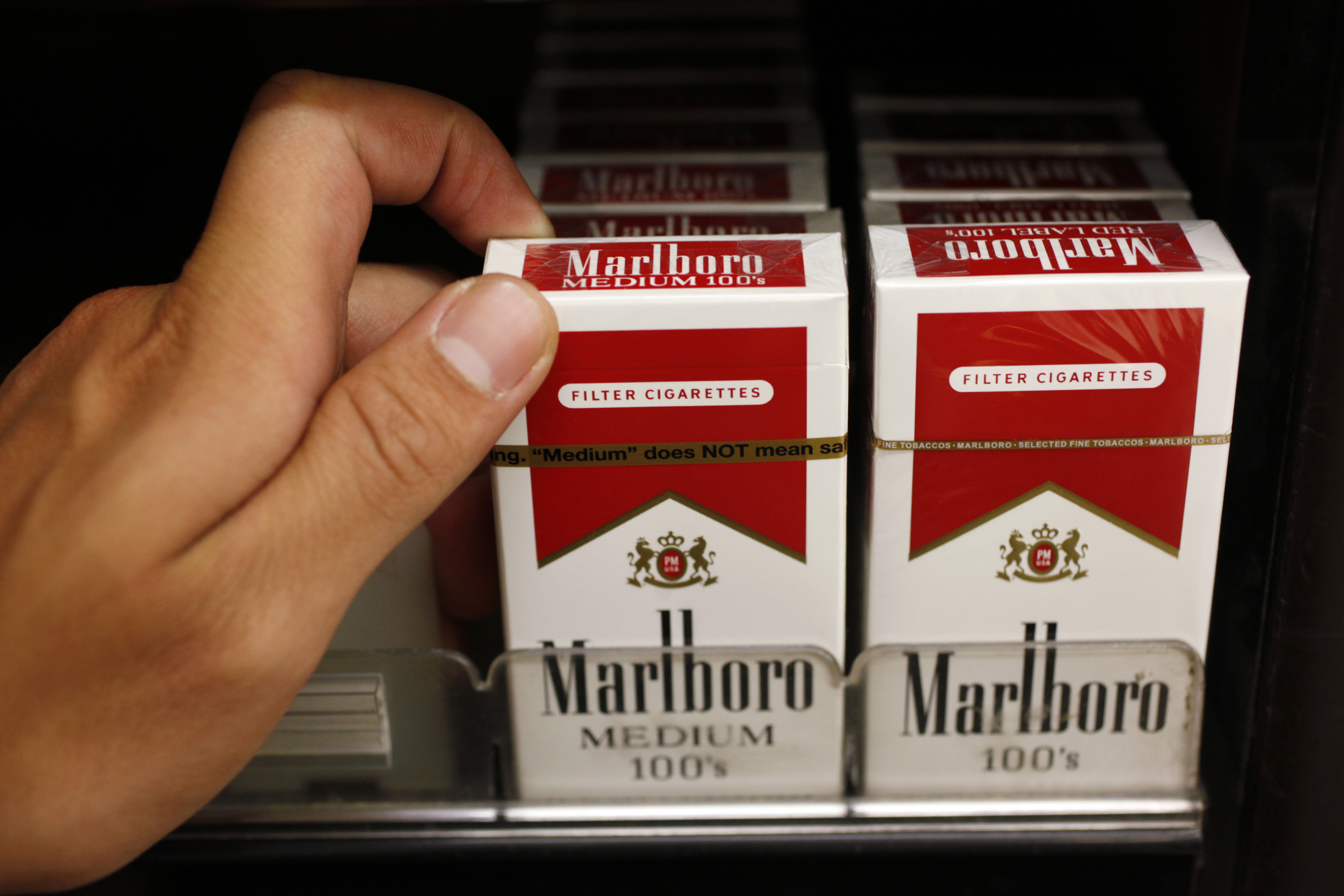Tennessee and cigarettes
A new law that kicks in July 1 will increase retailers' profits on selling cigarettes and, health advocates say, help reduce smoking. Here's what to know: * The new law raises retailers' minimum mark-up on cigarettes by 35 cents per pack in three stages over a two-year period. That's expected to increase their revenues by $56 million in fiscal 2015-16; $92.89 million in FY 2016-17 and $129.22 million in FY 2017-18 and subsequent years. * The average cost per pack will rise from $5 to $5.32 -- a 6.4 percent increase. * That's expected to result in a 2.24 percent decrease in cigarette sales. * Twenty-three percent of Tennessee adults smoke. Among students in grades 9-12, 21.6 percent smoke. * An estimated 11,400 Tennesseans die annually as a result of smoking. Annual health care costs directly caused by smoking are estimated at $2.67 billion. Sources: General Assembly's Fiscal Review Committee staff; U.S. Centers for Disease Control and Prevention, 2012 Tobacco Control State Highlights/Tennessee; Campaign for Tobacco-Free Kids
NASHVILLE -- Tennessee smokers will begin paying more for cigarettes on July 1 under a bill signed into law last week by Gov. Bill Haslam.
The 15 cents-per-pack increase is the first of three that will total 35 cents by July 1, 2017.
The change is technically not a tax hike. What lawmakers have done is increase the minimum price mark-up over retailers' "cost of doing business" for buying and selling a 20-cigarette pack.
The minimum now is 8 percent, or 41 cents per pack. That minimum will rise in three steps to 15 percent, or 76 cents per pack, over two years, according to a legislative fiscal analysis.
It's an 85 percent increase in the minimum mark-up and its expected to sweeten retailers' bottom lines by $129.22 million in year three, according to the analysis by the General Assembly's Fiscal Review Committee.
This is the first change in 65 years to Tennessee's Unfair Cigarette Sales Law. Twenty-five states have such laws, passed largely in the 1940s to 1960s in the name of protecting smaller retailers from unfair competition by chains and large discount stores.
In this case, convenience and grocery stores, including chains, lobbied for the increase, saying major tobacco manufacturers were pressuring them to keep prices at or near the minimum mark-up.
But retailers weren't alone in supporting the bill. Children's health advocacy groups joined in, among them the Children's Hospital Alliance of Tennessee, the March of Dimes and the Tennessee Chapter of the American Academy for Pediatrics. Research shows any hike in cigarette prices will spur smokers, especially kids, to kick the habit.
The average price of a pack is $5. The fiscal analysis estimates the change will decrease cigarette sales by 2.24 percent.
Emily LeRoy, executive director of the Tennessee Fuel & Convenience Store Association, said the increase is "good health legislation and it's good for retailers."
She said pressure from tobacco manufacturers to keep prices low meant convenience stores were making little to no money on a product that on average accounts for 20 percent of sales.
With Tennessee's high adult and youth smoking rates, health advocates were happy to join in backing the measure.
"We were very supportive of that bill," said Dr. Alan Kohrt, chief executive officer of T.C. Thompson Children's Hospital at Erlanger in Chattanooga and chairman of the Department of Pediatrics at the University of Tennessee College of Medicine in Chattanooga.
A 2013 survey of Tennessee smokers released by Gallup last year pegged Tennessee with the ninth-highest smoking rate in the nation at 23.6 percent. Kentucky was No. 1.
And a 2012 study from the U.S. Centers for Disease Control and Prevention said just more than 20 percent of Tennessee students in grades 9-12 smoke, giving the state 13th place nationwide.
The bill passed the Senate on a 32-0 vote, and by 81-14 in the House.
This was the third year that proponents pushed the measure. Supporters and opponents said it did not come from Republican Gov. Haslam's administration.
The governor and his family hold major stakes in Pilot Flying J, the largest operator of travel centers and travel plazas in North America. Haslam's older brother, James "Jimmy" Haslam III, is the privately held firm's CEO.
And Pilot Flying J does sell cigarettes and is a member of the Tennessee Fuel & Convenience Store Association.
Asked about Haslam, LeRoy said, "I will tell you this, we try to be very cognizant of that impression. So we did not directly lobby the governor on this bill."
David Smith, a Haslam spokesman, said the governor's ties to Pilot Flying J "had no bearing on his decision to sign the bill."
"Again, this is not an administration bill," Smith said. "This was a bill that had bipartisan support. I don't think it got a 'no' vote in the Senate. Any implication that the governor cared one way or the other about this bill is just not true. Again, we deferred [to the Legislature] when it first came out."
The bill's main House sponsor, Rep. Pat Marsh, R-Shelbyville, said the administration asked only that lawmakers account for lost revenue from the measure. The fiscal note estimated an $11,200 tax revenue loss in fiscal 2016, rising to $131,300 in fiscal 2018.
The fiscal note said the law would be nearly a wash for state coffers: Fewer cigarettes will be sold, meaning less revenue from Tennessee's 62-cents-per pack excise tax, but higher prices will result in higher sales tax collections. Local governments should see a $2.14 million increase in sales tax collections, the analysis indicated.
Lt. Gov. Ron Ramsey, the powerful Republican Senate speaker from Blountville, backed the bill at least in part because a convenience-store chain headquartered in his district favored it, according to two lobbyists involved in the issue. The chain was not Pilot Flying J.
A Senate Republican source confirmed that and said Ramsey himself asked the governor to make room for the decrease in the $33.8 billion budget.
Major tobacco companies, which are anxious about losing customers and traditionally oppose tax or cost-of-doing-business increases, didn't want to risk an outright fight with Ramsey, lobbyists said.
The bill did face opposition from the Beacon Center of Tennessee, a libertarian think tank and advocacy group.
"This government-imposed price hike amounts to a hidden tax increase, but it's actually worse than that," said Justin Owen, Beacon's president, in a missive aimed at lawmakers. "At least with a tax increase, that money is returned to the taxpayer in the form of government services. Here, the retailer gets to pocket it all."
T.C. Thompson's Kohrt said he's hoping the increased costs prompt changes. Smoking by parents, he said, has any number of negative impacts on children, ranging from low birth weight, increased risk for Sudden Infant Death Syndrome, ear infections to triggering asthma attacks.
"Tennessee has a very high incidence of asthma attacks," the pediatrician said. "And Chattanooga has one of the highest areas for incidents in the state. ... [Smoking] makes that much much worse."
Contact staff writer Andy Sher at asher@timesfreepress.com or 615-255-0550.

